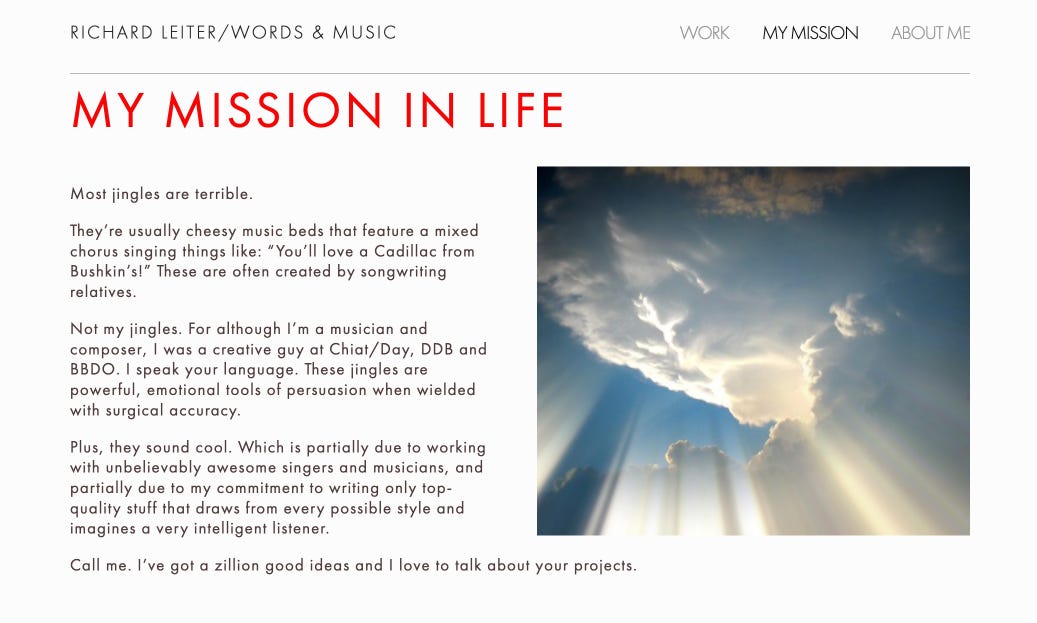- Motormouth
- Posts
- The dying art of jingle writing
The dying art of jingle writing
Winning the lottery is obviously a nice dream. But commercial writing is a reminder that music isn’t just big wins or abject failures. It’s also a job, which has moments of pride and satisfaction.
“I’m going to sing to you now,” songwriter Richard Leiter suddenly announces. I didn’t expect to hear him unleash his light, blues-tinged voice during our phone interview, but he is irrepressible, his voice bopping along over one of those sunny melodies you can’t get out of your head with a backhoe.
Cruising down the highway
On a Sunday afternoon.
The top is down
Sun is warm
Lilacs are in bloom.
And you see your baby smiling
In the corner of your eye.
So many reasons to stay alive.
Drive 55.
Drive 55.
Leiter was in his early 20s when he wrote that tune on spec for the California Highway Patrol; it was one of his first commercial music sales. Over the following decades, he’d write countless jingles in innumerable styles for clients ranging from supermarkets and superstores to clothing outlets and casinos.
In the popular imagination, musicians tend to be either starving artists suffering for their craft or superstars with global accolades, hit records, and mansions. But Leiter’s career, like a car tooling at reasonable speeds down the highway, has found a middle groove. “I love jingles,” he says, the italics clearly audible. “I feel like in some ways I was born to write jingles.”
Despite his enthusiasm, Leiter did not actually come into the world singing. He started soon after, though. At 13, he played in a jazz trio and performed regularly in Baltimore. After an abortive effort to please his family by taking pre-med courses in college, he headed to Hollywood, where he picked up whatever gig work he could perform: Salsa, Country, R&B, Jazz, Polka, and more. As a day job, he started working as a copywriter and creative director at agencies like DDB and BBDO.

Leiter's mission is simple: to bring the world better jingles. Image via Richard Leiter
The experience of writing ad copy combined with performing in so many musical styles turned out to be perfect training for jingle writing. Leiter has written soul jingles, pop jingles, Broadway jingles, calypso jingles, and even a comic opera jingle for Pasta Sampler sale. In just one radio ad campaign for Sheraton’s Zacks restaurant, he did a 20s vaudeville composition, a 30s swing tune, and a 50s doo-wop number.
Leiter uses his talents to sell things. But he doesn’t see that as selling out. On the contrary, he takes pride in craftsmanship and loves the way music connects with people enough that they want to check out a product or change their behavior. He still remembers a friend who was shocked to hear he’d written the highway patrol jingle she’d hummed along to on the radio. She told him it had made her think of her children and step on the brakes. “That was really eye-opening for me,” Leiter said. “I saw the power in it.”
Leiter also enjoys working with clients and figuring out how to deliver on their vision. Before Covid shut live performances down, he loved performing at weddings. He even loves booking them. “I love talking to brides,” he laughs. “I’m the only one of my friends who does!” One of his best jingles for the Lucky department store is a tribute to his listening abilities as much as to his writing. He jotted down the stakeholder’s notes during the meeting: “It’s a real good store. Makes you feel good. Fresh ingredients so you can whip up a meal. It’s just a nice place. And you have to say “low price.” The almost indecently catchy New Orleans funk lyrics? “It’s the real good, feel good, whipping up a meal good, so nice, low-price store!”
While Leiter loves jingles, they’re no longer central to his business. Most brands no longer want jingles. In 1998, an American Association of Advertising Agencies survey found that about 10% of 30-second ads used jingles; in 2011, the number was only about 3%. Leiter says numbers have gotten even more dire over the last 10 years. Instead, brands license pop songs or commission background music that sounds like a contemporary pop song.
Many don’t have lyrics, or else they use generic language about love and good times. But they don’t tell you directly to go shop at Lucky’s.
This is the kind of music for commercials that Austin-based indie rock musician Mobley has been writing for the last few years. Mobley’s an amazingly versatile live performer. In his astonishing one-man-band live performances, he plays guitars, keyboards, drums, and bass, as well as sings. Last year, after COVID hit, he organized a remarkable Exquisite Corpse project for the Central Texas Food Bank, in which 30 musicians and video creators bounced off each other’s notes and images to create a seamlessly disjunctive video album.

Austin songwriter, producer, and one and band Mobley
Mobley often plays in packed clubs, and during non-Covid times, he tours constantly. Nonetheless, it’s not quite enough to pay the bills. He supported his early music career with a day job as a web developer. His ad agency connections meant he’d occasionally hear of opportunities to write for commercials.
Before long, he had signed a publishing deal for his songwriting and music. The publisher had a commercial arm, and Mobley started recording a lot more demos for brands and products. Because he was working through his publisher, he would often be paid a fee for working on the material, even if the music wasn’t picked up by the client—an unusual arrangement.
Mobley isn’t as ebullient about the commercial music business as Leiter is. He doesn’t love it or see it as his true calling; instead, he says, like any employment, it’s “a way to stave off homelessness and starvation.” His role as a subcontractor means he rarely gets to talk to clients directly and doesn’t get to make the personal connection Leiter enjoyed when he created his jingles. He will receive general instructions to create “vague, universal lyrics about some feeling they want to evoke.” Often, the client includes a demo tape with a song they don’t have rights to; Mobley’s job is to create something in that style without plagiarizing it.
The process can be frustrating. Still, Mobley says, the challenge is worthwhile. “It was really useful in developing my chops as a writer and a producer, having to just work in a bunch of different styles on the fly. It's a really good exercise. And I found it really generative for my artistic career in that way,” he told me.
Most examples of Mobley’s work in this vein are covered by NDAs, so he couldn’t share them. He says sometimes, “a brand or network or something will come to you, and they'll want you to provide your particular artistic point of view. Honestly, that’s way more fun.”
One of Mobley’s favorite commercial compositions was commissioned by a fan at ESPN. They wanted him to provide them with a cover of Bill Withers’ hit “Lovely Day.” Withers happens to be a personal hero of Mobley’s, so it was a dream assignment. His version has a contemporary electro-pop edge instead of Withers’ orchestral flourishes. But he captures Withers’ laid-back singing and the intimate joy that expands to fill the world.
Both Leiter and Mobley are quick to emphasize that commercial music is not a sure path to fortune, much less fame. Commercial writing opportunities are sporadic and not always lucrative. Neither artist writes advertising music full-time.
But writing for commercials has helped both of them diversify—they’ve had some income coming in even as live opportunities have dried up during the last year. For non-superstars, writing for advertising can be one way to avoid being a starving artist. Mobley compared commercial writing to being an Uber driver—It’s an uncertain gig that mostly provides a moderate income unless you get incredibly lucky and someone leaves a winning lottery ticket in your car—which is the equivalent of Nike buying your tune for a national ad campaign.
Winning the lottery is obviously a nice dream. But commercial writing is a reminder that music isn’t just big wins or abject failures. It’s also a job that has moments of pride and satisfaction.
Commercial musicians get people humming about driving 55 on a lovely day not to conquer the world but so they can get up and write something else tomorrow.
Reply